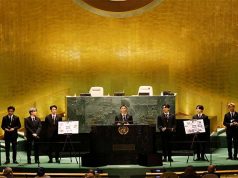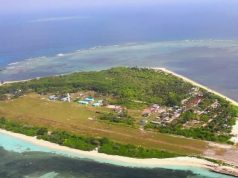
Foreign Affairs Secretary Teodoro “Teddy” Locsin Jr. recently tweeted that earth is “nothing” without humans as a response to a writer’s post on a recent volcanic eruption in Indonesia.
The top diplomat was responding to freelance writer Shannon Stirone who tweeted about the eruption of Anak Krakatau volcano last April 10.
“Krakatoa has just erupted. The Earth is doing a really good job of reminding us that we are just guests here,” she wrote as she shared a video of the volcano’s eruption.
Anak Krakatau, a volcano in Lampung, Indonesia, erupted last week in what is considered its “longest eruption since 2018.”
The volcano initially spewed “a 200-meter-high column of ash and smoke.” Its ash column eventually reached 500 meters and lasted for 38 minutes and four seconds.
Locsin retweeted Stirone’s tweet and commented:
“I’d like to remind Earth that we are not guests. There is no Earth without us; we even gave this rock its name. Kill us and you extinguish yourself like you’d never existed. Humans make history. The planet is just the stage. Earth won’t even be history.”
The tweet has since been deleted from Locsin’s account but some Filipinos took a screenshot of his remarks.
@teddyboylocsin hi did you really say this pic.twitter.com/lgj4JgSgHY
— Bibe (@BibeRoldan) April 12, 2020
When a Twitter user asked Locsin to confirm the tweet, the top diplomat simply replied, “Read Berkeley. George Berkeley. The philosopher, not the university.”
George Berkeley was an Irish philosopher who is known for advocating metaphysical idealism or the view that “only minds and their thoughts and feelings are real” in the world.
The earth can outlive humans
Meanwhile, Locsin’s response on Stirone’s tweet irked some Twitter users who called him out for his “sense of entitlement” on the matter.
“Teddy Boy Locsin, Jr.’s sense of entitlement clearly shows he has learned nothing from the social sciences and sciences in general. Humans may be at the top of the food chain, but earth will continue to live long after we die (or become extinct),” an online user claiming to be a bio-archaeologist in training said.
Another Twitter user pointed out that the planet can still survive sans humans while the latter, on the other hand, cannot.
“May we remind you that EARTH can LIVE without US but You or US as humans cannot live without EARTH,” she said.
“Does Teddy Locsin Jr. know how Earth was formed 4.543 billion years ago scientifically? Maybe not?” another online user wrote.
American journalist Elizabeth Kolbert, the author of the Pulitzer Prize-winning book “The Sixth Extinction: An Unnatural History,” believes that the future of humans depends on their carbon emission on earth in the “next 50 years.”
A National Geographic article used her as one of its references in a March 2020 report.
“By 2070, she expects rising seawaters to render the Marshall Islands and the Maldives uninhabitable; to flood Norfolk, Virginia half the year; to char and scar places like Australia and California during longer and more intense wildfire seasons,” the report said.
A theoretical astrophysicist and science writer also wrote that while “many catastrophic events await our world in the future,” the planet earth will “survive most of them.”
“After 2 billion years, increased energy output from the Sun will boil Earth’s oceans, but the planet itself will survive,” astrophysicist Ethan Siegel wrote.
Humans under the circumstances Siegel described cannot live or inhabit areas where bodies of water such as oceans are on boiling point.
In another report, the National Geographic says that the human body cannot handle an internal temperature close to 40 degrees Celsius because this is where “all-important cellular machinery” starts to break down.
Similarly, up to 75% of people are estimated to be threatened by “deadly heatwaves” by 2100 if there is no decrease in carbon emissions.









